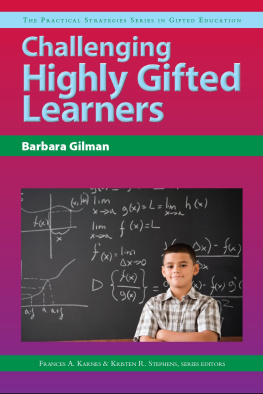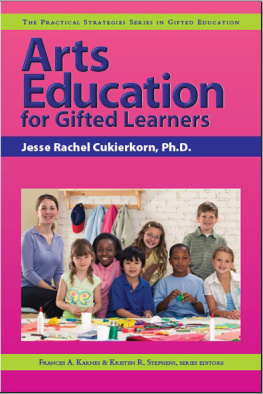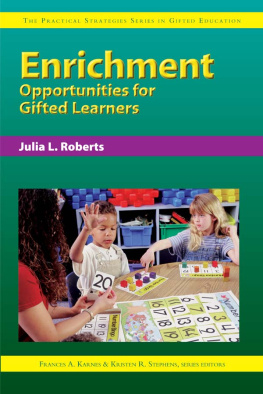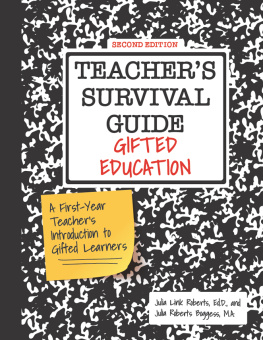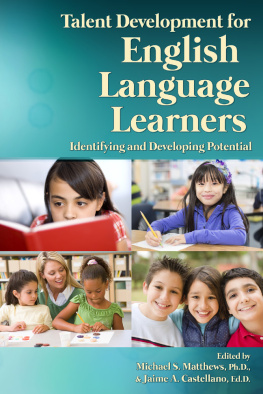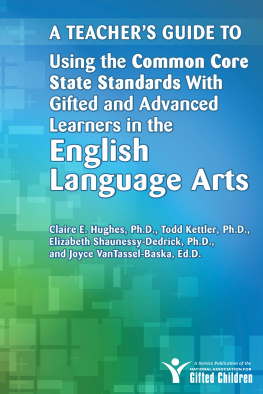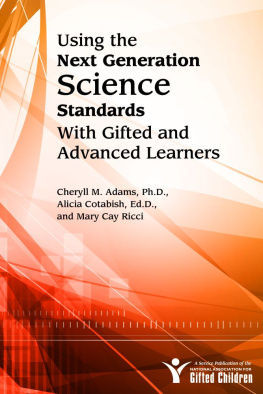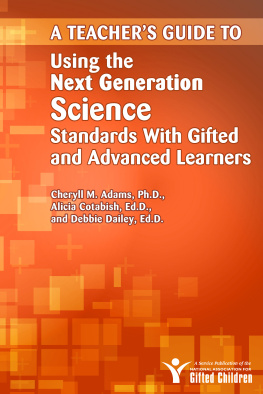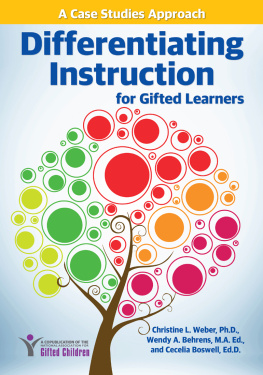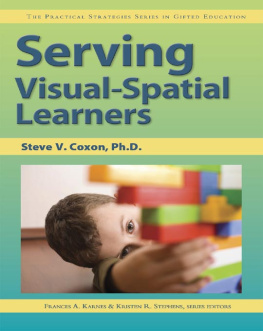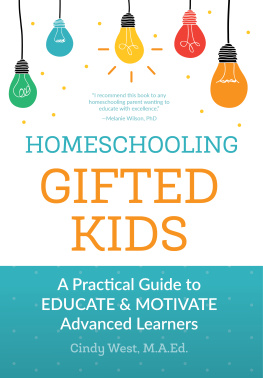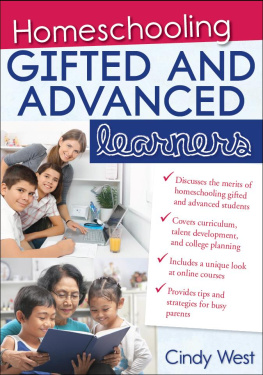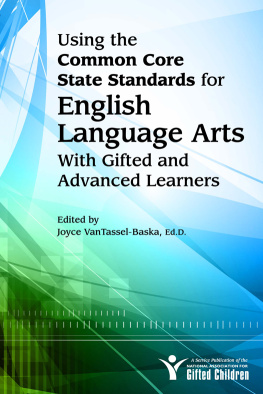Barbara Gilman - Challenging Highly Gifted Learners
Here you can read online Barbara Gilman - Challenging Highly Gifted Learners full text of the book (entire story) in english for free. Download pdf and epub, get meaning, cover and reviews about this ebook. year: 2008, publisher: Sourcebooks, genre: Children. Description of the work, (preface) as well as reviews are available. Best literature library LitArk.com created for fans of good reading and offers a wide selection of genres:
Romance novel
Science fiction
Adventure
Detective
Science
History
Home and family
Prose
Art
Politics
Computer
Non-fiction
Religion
Business
Children
Humor
Choose a favorite category and find really read worthwhile books. Enjoy immersion in the world of imagination, feel the emotions of the characters or learn something new for yourself, make an fascinating discovery.
- Book:Challenging Highly Gifted Learners
- Author:
- Publisher:Sourcebooks
- Genre:
- Year:2008
- Rating:5 / 5
- Favourites:Add to favourites
- Your mark:
- 100
- 1
- 2
- 3
- 4
- 5
Challenging Highly Gifted Learners: summary, description and annotation
We offer to read an annotation, description, summary or preface (depends on what the author of the book "Challenging Highly Gifted Learners" wrote himself). If you haven't found the necessary information about the book — write in the comments, we will try to find it.
Challenging Highly Gifted Learners — read online for free the complete book (whole text) full work
Below is the text of the book, divided by pages. System saving the place of the last page read, allows you to conveniently read the book "Challenging Highly Gifted Learners" online for free, without having to search again every time where you left off. Put a bookmark, and you can go to the page where you finished reading at any time.
Font size:
Interval:
Bookmark:
IN GIFTED EDUCATION
series editors
FRANCES A. KARNES & KRISTEN R. STEPHENS
Highly Gifted Learners
Barbara Gilman

P RUFROCK P RESS I NC .
Copyright 2008 by Frances A. Karnes
and Kristen R. Stephens-Kozak
All rights reserved.
No part of this book may be reproduced, translated, stored in a retrieval system, or transmitted, in any form or by any means, electronic, mechanical, photocopying, microfilming, recording, or otherwise, without written permission from the publisher.
Printed in the United States of America.
ISBN-13: 978-1-59363-771-2
At the time of this books publication, all facts and figures cited are the most current available. All telephone numbers, addresses, and Web site URLs are accurate and active. All publications, organizations, Web sites, and other resources exist as described in the book, and all have been verified. The authors and Prufrock Press, Inc., make no warranty or guarantee concerning the information and materials given out by organizations or content found at Web sites, and we are not responsible for any changes that occur after this books publication. If you find an error, please contact Prufrock Press, Inc. We strongly recommend to parents, teachers, and other adults that you monitor childrens use of the Internet.
| Prufrock Press Inc. P.O. Box 8813 Waco, Texas 76714-8813 Phone: (800) 998-2208 Fax: (800) 240-0333 http://www.prufrock.com |
Social Development: How Important
Is Placement With Age Peers?
The Practical Strategies Series in Gifted Education offers teachers, counselors, administrators, parents, and other interested parties up-to-date instructional techniques and information on a variety of issues pertinent to the field of gifted education. Each guide addresses a focused topic and is written by scholars with authority on the issue. Several guides have been published. Among the titles are:
- Acceleration Strategies for Teaching Gifted Learners
- Curriculum Compacting: An Easy Start to Differentiating for High-Potential Students
- Enrichment Opportunities for Gifted Learners
- Independent Study for Gifted Learners
- Motivating Gifted Students
- Questioning Strategies for Teaching the Gifted
- Social & Emotional Teaching Strategies
- Using Media & Technology With Gifted Learners
For a current listing of available guides within the series, please contact Prufrock Press at (800) 998-2208 or visit http://www.prufrock.com.
Savannah smiled graciously, her mature height and articulate speech disguising her relative youth. Im full time at the high school this year, she beamed, having begun the previous fall at age 12, after completing 40 credits of high school work while in middle school. Modifications to Savannahs education began in earnest in the fall of her fourth-grade year, when she revealed to her parents that she knew most of what was being taught and wished she could move ahead. In a subsequent meeting, her teachers tactfully admitted the quiet student showed no signs of needing advanced work, but individual assessment results told a different story. Savannahs highly gifted Wechsler IQ scores, near the ceiling of the test, and advanced achievement levels convinced a fifth-grade teacher at the meeting to let her visit his classroom. Savannah never left, immediately finding a more comfortable fit with older classmates and more advanced work. The teacher particularly supported her love of science with projects she shared with other gifted students.
The following year, working at home, Savannah completed Stanford Universitys Education Program for Gifted Youth (EPGY) math coursework through prealgebra, earning high grades. As her sixth-grade year was about to begin at school, she hoped for more advanced math and science, but wished to remain with the class she had joined in fifth grade. More confident now of her potential success, school personnel allowed her to take Algebra I with the eighth graders, skip sixth-grade science, and take seventh- and eighth-grade science concurrently. Savannah performed beautifully, even rejecting the thoughtful counselors offer to create a circle of friends to ease her transition into the eighth-grade math class. She was fine, she assured him, and her algebra teacher had to agree.
In fact, Savannah was more than fine. She began to flourish and this introverted student gained confidence in her abilities. Soon, she was taking high school classes, happily challenging herself and blossoming in the process. Although not specifically designed for a highly gifted student, this patchwork of higher level classes met Savannahs needs well enough that she turned down the opportunity to attend a charter school for advanced students, preferring to stay with the friends she had made.
Unfortunately, in the midst of a decision about weighted grades, class rank, and the extreme competition to become valedictorian in some of the districts high schools, Savannahs local school board decided to eliminate the opportunity for any middle schooler to earn high school credit prior to entering high school full time. One official opined that the only reason he could imagine for a middle schooler to take high school classes would be to gain an early lock on becoming valedictorian. The student could thereby increase the number of weighted-grade classes beyond what a typical 4-year high school student could take and ensure the highest grade point average (GPA).
Of course, Savannah was unaware of such concerns. She simply wanted work that was satisfying and already had been embarrassed to accept even small honors in awards assemblies, stating that was not the reason she worked diligently. The school district compromised to allow Savannah to keep her course credits, but her top grades in those courses would not be used to compute her GPA. Now, she would have a less-than-typical chance of becoming valedictorian, with fewer weighted-grade classes and only the hardest ones left to take. At least she would be able to terminate her high school career earlier and move on.
Although Savannahs specific needs are unique, her general situation is not. In-class accommodations for the gifted rarely are adequate for the highly gifted child. Enrichment pull-outs also fail to address achievement levels several grades higher than a childs placement. Most highly gifted students require acceleration, either subject level or full grade, at various points in their education. When advanced, they typically do well and enjoy a better fit socially. Identifying their needs can be difficult without in-depth, individual assessment, especially because introversion is their dominant personality style (Silverman, 1998) and most hesitate to self-advocate. Finally, because the academic progression of highly gifted students is so unusual, a variety of rules and red tape developed for average students can frustrate their progress.
Savannah maintained her optimism, but many highly gifted children succumb to school difficulties. As a group, our most gifted students are not our highest achievers. Clinicians who work with the gifted know that the moderately gifted child (IQ 130), at two standard deviations above the mean, stands a better chance of experiencing satisfaction and performing optimally in typical schools than more highly gifted students. At three standard deviations above the mean (IQ 145), the
Font size:
Interval:
Bookmark:
Similar books «Challenging Highly Gifted Learners»
Look at similar books to Challenging Highly Gifted Learners. We have selected literature similar in name and meaning in the hope of providing readers with more options to find new, interesting, not yet read works.
Discussion, reviews of the book Challenging Highly Gifted Learners and just readers' own opinions. Leave your comments, write what you think about the work, its meaning or the main characters. Specify what exactly you liked and what you didn't like, and why you think so.

